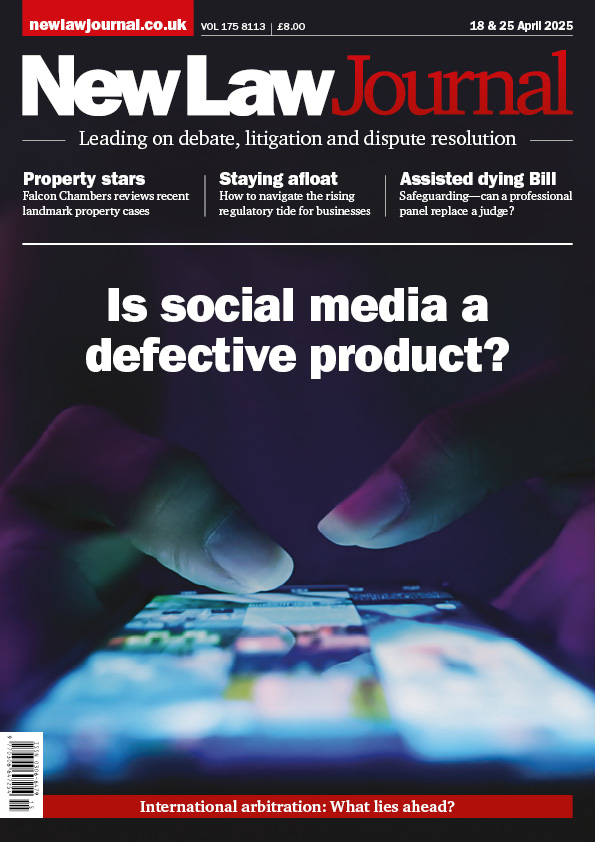THIS ISSUE

The safeguarding role of a High Court judge in the assisted dying bill currently before Parliament has been replaced by the oversight of a panel comprising a psychiatrist, social worker and lawyer. In this week’s NLJ, Sir Mark Hedley, a retired High Court judge, shares his reflections on the loss of the judicial role itself.
Now is the time to take a proactive approach to barristers’ wellbeing, rather than waiting for things to go wrong: Barbara Mills KC sets out the case for better support
The dizzying array of regulatory requirements facing UK businesses is about to increase, with new ‘failure to prevent fraud’ duties in force in September and the proposed duty to prevent sexual harassment. In this week’s NLJ, Kerry Garcia, partner and head of employment, immigration & pensions, and James Evison, partner, at Stevens & Bolton, offer some practical steps for employers.
Thomas R Snider, Dalal Alhouti & Robin Hayden consider the key developments in international arbitration in 2024 & what practitioners should watch for in 2025
In the first part of a new series, Harry Lambert puts social media firms under the spotlight, asking: to what extent are they liable for harm?
What does the rest of 2025 have in store for international arbitration, and what are the key takeaways from 2024? Thomas R Snider, partner and head of international arbitration, Dalal Alhouti, knowledge development lawyer, and Robin Hayden, trainee solicitor, at Charles Russell Speechlys, set out the salient events in this week’s NLJ.
Ciarb’s Virtual Global Diploma offers in-depth training in international commercial arbitration
Failure to prevent fraud, sexual harassment & more: Kerry Garcia & James Evison unpack the increasing number of compliance measures facing UK businesses this year
Could social media firms be sued for harm caused to users? In the first of a three-part NLJ series on social media firms, Harry Lambert, Outer Temple Chambers, looks through ‘the lens of product liability, essentially posing the question: can social media platforms be conceptualised as defective products?’
In the first part of a new series for NLJ, Fern Schofield & Gwyneth Everson set out the facts & the significance of the most noteworthy property cases from the past few months
MOVERS & SHAKERS

Carey Olsen—Kim Paiva
Group partner joins Guernsey banking and finance practice
.tmb-mov69x69.jpg?sfvrsn=16d9dd3d_1)
Morgan Lewis—Kat Gibson
London labour and employment team announces partner hire

Foot Anstey McKees—Chris Milligan & Michael Kelly
Double partner appointment marks Belfast expansion
NEWS
The Ministry of Justice (MoJ) has not done enough to protect the future sustainability of the legal aid market, MPs have warned
Writing in NLJ this week, NLJ columnist Dominic Regan surveys a landscape marked by leapfrog appeals, costs skirmishes and notable retirements. With an appeal in Mazur due to be heard next month, Regan notes that uncertainties remain over who will intervene, and hopes for the involvement of the Lady Chief Justice and the Master of the Rolls in deciding the all-important outcome
After the Southport murders and the misinformation that followed, contempt of court law has come under intense scrutiny. In this week's NLJ, Lawrence McNamara and Lauren Schaefer of the Law Commission unpack proposals aimed at restoring clarity without sacrificing fair trial rights
The latest Home Office figures confirm that stop and search remains both controversial and diminished. Writing in NLJ this week, Neil Parpworth of De Montfort University analyses data showing historically low use of s 1 PACE powers, with drugs searches dominating what remains
Boris Johnson’s 2019 attempt to shut down Parliament remains a constitutional cautionary tale. The move, framed as a routine exercise of the royal prerogative, was in truth an extraordinary effort to sideline Parliament at the height of the Brexit crisis. Writing in NLJ this week, Professor Graham Zellick KC dissects how prorogation was wrongly assumed to be beyond judicial scrutiny, only for the Supreme Court to intervene unanimously







